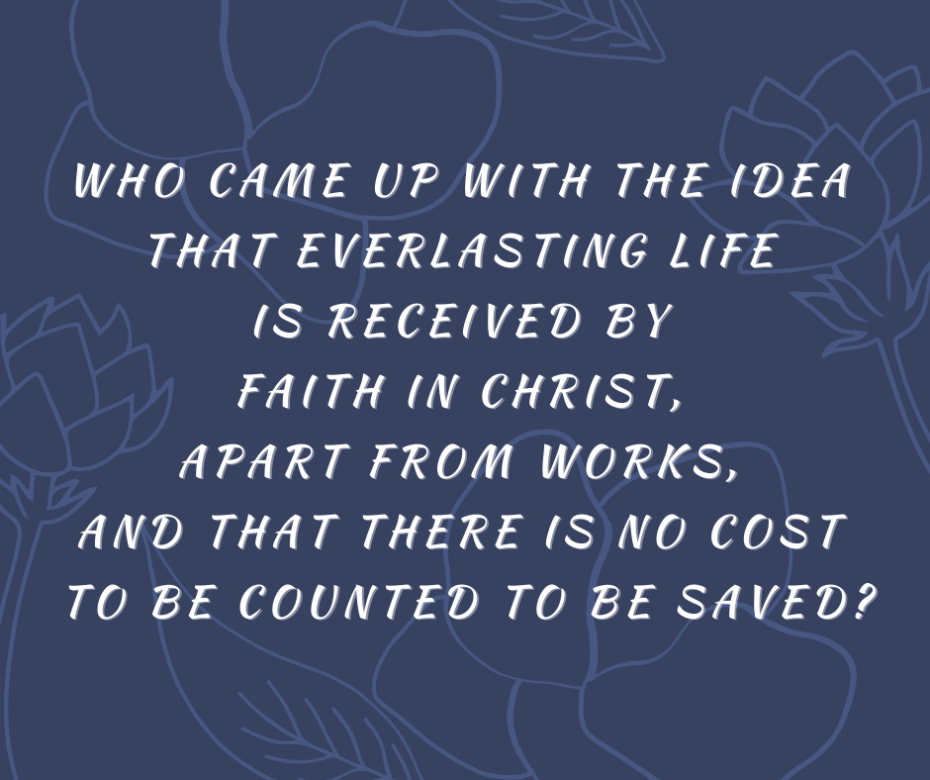A friend named Ken sent me this intriguing email in response to a blog I wrote:
I agree with you that modern evangelistic methods are wrong in their approach to the invitation to receive eternal life.
I think Jesus made the invitation very simple and easy to grasp.
I’m seeing something in the corner of my eye here. Whenever Jesus offers eternal life by believing in Him, basically He is giving an invitation to receiving eternal life.
A small example would be this verse, John 6:35, where Jesus said, “I am the bread of life. He who comes to Me shall never hunger, and he who believes in Me shall never thirst.”
This has a similar point to the time when Jesus was talking to the woman at the well in John 4.
I think Jesus made it simple to receive eternal life without making it complicated.
P.S. I think Jesus was the founder of easy believism.
I think Ken is correct, though we need to clarify about the expression easy believism.
That expression is not one embraced by me or other Free Grace proponents. It is one that opponents of the free gift of everlasting life use to disparage our position.
Easy believism is explained in different ways by different people. Gotquestions.org, in an article entitled “What Is Easy Believism?” (see here), gives two different understandings of the expression:
Easy believism is a somewhat derogatory term used by opponents of the view that one needs only to believe in Jesus in order to be saved. From this they conclude that those who hold to sola fide (“faith alone”) teach that no corresponding need exists for a committed life of Christian discipleship as proof of salvation; however, that is not what sola fide means. True faith in Christ will always lead to a changed life. Another common usage of the term easy believism is in regards to those who believe they’re saved because they prayed a prayer—with no real conviction of sin and no real faith in Christ. Praying a prayer is easy—thus the term easy believism—but there is more to salvation than mouthing words.
Concerning the first understanding, note that they add this telling comment, “True faith in Christ will always lead to a changed life.”
Gotquestions.org went on to make this remarkable statement:
Salvation is certainly free, but, at the same time, it costs us everything. We are to die to ourselves as we change into the likeness of Christ. Where easy believism fails is its lack of recognition that a person with faith in Jesus will lead a progressively changed life. Salvation is a free gift from God to those who believe, but discipleship and obedience are the response that will no doubt occur when one truly comes to Christ in faith.
That same sentiment can be found in James Boice’s book Christ’s Call to Discipleship (pp. 105-114), John MacArthur’s The Gospel According to Jesus, 2008 edition (pp. 148-50), and Wayne Grudem, Free Grace Theology: 5 Ways It Diminishes the Gospel (pp. 32-39, 84-97).
Free salvation that costs us everything? That would be like a car salesman saying, “This Lamborghini is free, Mr. Smith. We have looked at your credit history, and we see that you have no debts and that you have $2 million in assets. If you will just sign all your assets over to us, then this wonderful free car will be yours.” How can something be free to the recipient and yet cost the recipient everything? Answer: it cannot be.
The odd thing is that gotquestions.org, Boice, MacArthur, and Grudem all say that everlasting life is received by faith alone, apart from works. But then they define faith in such a way as to include or guarantee a lifetime of good works. They say that in order to believe in Christ, one must count the cost of being born again.
The Lord Jesus taught that everlasting life is a free gift and that it costs the recipient nothing, though it cost Him suffering and death. He indicated that all who simply believe in Him have everlasting life.
I do not know if it is easy or hard to believe that. Since two-thirds of the people in the world do not even claim to be Christians, and furthermore since even within Christianity the majority do not believe that salvation is without cost for the believer, it is hard to say that it is easy to believe in Christ for the free gift of everlasting life. However, whether it is hard or easy, it is certainly believism. The Lord Jesus repeatedly said that whoever believes in Him will not perish but has everlasting life (John 3:14-18; 4:1-26; 5:24; 6:35, 37, 39, 47; 11:25-26; Rev 22:17). He called salvation “the gift of God” (John 4:10).
It is true, of course, that the Lord also said that believers were to count the cost of discipleship (e.g., Luke 14). But discipleship and salvation are two different issues. Discipleship is learning about Christ and following Him. Salvation is the free gift of everlasting life. Discipleship is costly. Salvation is free. For more on that distinction see this 2011 article by me on discipleship and self-denial and this 2016 blog by me on following Christ, Luke 14, and counting the cost of discipleship.
I agree with Ken. The Lord Jesus is the founder of easy believism.


